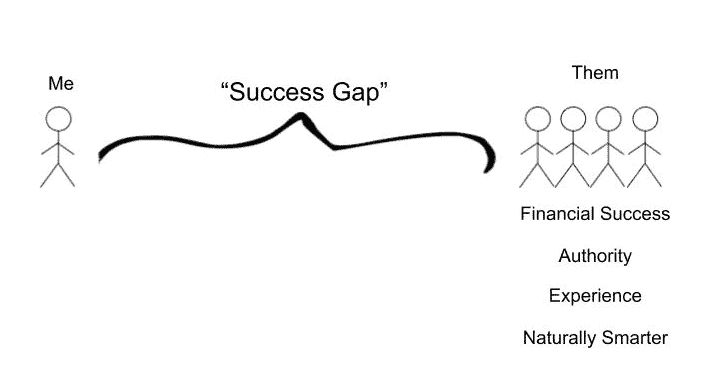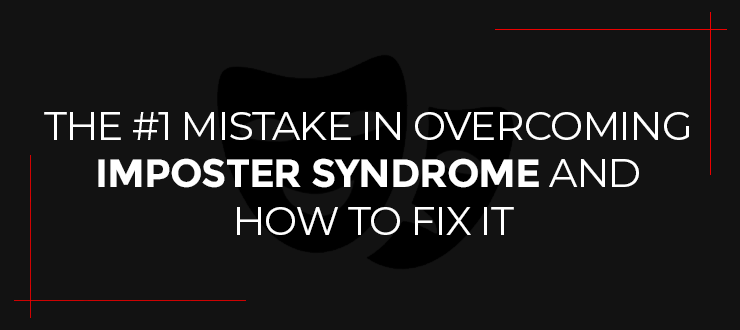Here's a paradoxical question, what if because Imposter Syndrome is so common that it doesn't actually make any sense?
The Social Gathering
Meet David. David's a good guy and he's also seen a fair amount of success, but is starting to get that uncomfortable feeling in his stomach. A big conference is coming up.
He wants to network and connect with others but he's afraid he'll shell up again.
David's rational Human Brain has read enough self improvement books to know what he should do.

Rational Human Brain
"If we want to keep growing we have to put ourselves out there... Growth is uncomfortable but hey, we want to be winners. Let's step out of our comfort zone this time and go for it!
Besides, last time we just kept to ourselves we ended up feeling bad and regretting it."
But when the conference actually begins his Emotional Survival Monkey wakes up...

Emotional Survival Monkey (ESM)
"That's all true, but who are we to be talking to these people and mingling with them? We're not as successful or smart as they are. They'll see right through us and think we're frauds!"
"Just be as quiet as possible, ask a polite and semi interesting question and avoid saying anything stupid. Stick to that and we'll be fine."
And as you might have guessed, the Emotional Survival Monkey ends up winning.
In the heat of the moment, David's rational Human Brain is no match for the fears and doubts that his Emotional Survival Monkey weaponizes against it.
So regrettably David ends up going to the conference, staying in his comfort zone, playing it safe and talking to no one. Again.
You're Special, but You're Not Special
Here's an interesting question. If you had to guess who this David person is, who would he be:
- A 6 figure entrepreneur who's just starting out
- A 7 figure entrepreneur who is making the transition from founder to CEO
- An 8 figure entrepreneur who is leading a 50+ person team
So which one is he? A, B or C?
Well... He could actually be hidden option D. Any of the above!
The weird thing here is that people of all backgrounds, genders and success levels struggle with imposter syndrome.
Regardless of how much they've accomplished they are still challenged with their sense of worthiness and insecurities when talking to others.
So how does that make any logical sense? Well it doesn't and that's the point.
The #1 Mistake
The biggest mistake that driven and motivated people make when trying to overcome imposter syndrome is that they don't understand what's actually causing it.
Trying to find a solution when we haven't clearly understood the problem is like a doctor deciding on surgery without actually knowing what's wrong. It can do more harm than good.
It's a primary reason why people get so frustrated when they make so much effort to overcome their imposter syndrome and nothing changes.
Whenever that feeling of discomfort starts we create a list in our head of why we're feeling this way:
- "These people are more advanced than me."
- "I'm not as smart as them"
- "What I do is so simple and basic. Everyone knows this stuff!"
We try to find the issue that's causing this feeling (we're not as good) and figure out a solution to this issue (one day in the future I'll possibly be as good as they are and then it will be ok).
We attribute this sense of imposter syndrome to a "success gap".

But is this the actual cause?
As we saw with the Davids (Davids = plural David) example, people of all success levels are affected by Imposter Syndrome.
So there must be something else going on here, right?
Emotional Fears vs. Rational Concerns
In reality Imposter Syndrome is not a rational concept that can be tied to certain "success metrics" or levels of accomplishment, but rather an emotional fear that 99.9% of humans have.
An emotional fear of possibly appearing foolish, being seen as frauds and potentially being rejected and outcast from our tribe which would have been a death sentence back when we were roaming the savannas.
It's why the fear of rejection still terrifies us from a very primal evolutionary place in our minds.
It's why our Emotional Survival Monkey goes ballistic in these situations and hijacks our logic.
He overpowers our rational concerns and analysis with emotional fear.
Since Imposter Syndrome exists on all spectrums of success it's not a logical issue. It stems from our primal survival instincts and is an emotional fear, NOT a logical and rational concern.
Recognizing this can be the turning point.
The moment we recognize that something is not a rational concern but rather an instinctual emotional fear we can stop trying to rationalize our way out of our emotions. Something that rarely works..
So now that we recognize that imposter syndrome is not a valid rational concern but an emotional fear that's being driven by our Emotional Survival Monkeys let's deal with it as such.
Differentiating Positive and Negative Indicators
First off, whenever we sense imposter syndrome, fear, or our Emotional Survival Monkey making an appearance we need to step back, reframe the situation in line with our modern day reality and recognize it as a positive sign.
A sign that we're taking the necessary first step and are outside of our comfort zone and into our growth zone.
A place where a certain level of fear and discomfort will always be present.
It's why that expression of "Lean into your fears" makes sense.
So we need to recognize and anticipate this feeling and embrace it as a positive sign, not as fuel for our Emotional Survival Monkeys!
In order to really grow and take the next step we have to ask ourselves an honest question:
"What kind of person do I want to be?"
"Will I succumb to what is an emotional fear and let my Emotional Survival Monkey dictate how I live my life or will I choose to act courageously instead?"
The reason it's important to ask this is to recognize and accept that your Emotional Survival Monkey will always be present. For good and bad you're stuck with him for life... Like everyone else.
Yet the kind of people we admire and strive to be like don't let their monkey's dictate their lives.
They see situations where they pop up as an opportunity to practice being courageous, right?
Well, this is our opportunity to do the same.
To recognize that emotional fear and discomfort will always be present, but to move forward anyway.
To accept that fear and discomfort are part of the game of life.
It's the price of admission we must be willing to pay if we want to keep growing, advancing and evolving in life.
Taming Our Survival Monkey
So when you think about it, being able to tame our Emotional Survival Monkey is a core life skill.
Something that if we master will have ripple effects in all areas of our lives, right?
With the right perspective we can view situations that evoke a feeling of Imposter Syndrome as nothing more than a beautiful opportunity to practice taming our monkeys.
It's why situations that make us feel uneasy, unworthy or insecure in the present moment are actually long term gifts in disguise.
They give us the opportunity to grow into the people we want to become.
The moment we can reframe things in this way our Emotional Survival Monkey immediately loses 80% of its power over us.
Next time you feel a bout of imposter syndrome popping up you can say:
"Yes, this situation will be uncomfortable in the short term and various feelings and fears will arise, but as far as my long term goals and who I want to become.... Well this is an amazing gift to practice taming my monkey!."
And since we can now put those feelings in their proper place we can much more easily DECIDE to step up, do what our Rational Human Brains know will serve us best in the long run and go for it.
The 4 Questions to Overcome Imposter Syndrome
So now that we understand the theory and why this happens here's a practical 4 question process to use when you feel that sense of unworthiness, insecurity and imposter syndrome starts to rear its ugly head.
- What's actually going on here, is this a logical concern or is my Emotional Survival Monkey hijacking my brain?
- What kind of person do I want to be (One who succumbs to fear or one who steps up)?
- What would that person do in the face of this fear?
- Finally, will I decide to do what's scary, but will help me achieve more long term success, growth and internal happiness or will I choose comfort and suffer the pain of regret?
Or in short, DECIDE not to be the kind of person who succumbs to fear and his Emotional Survival Monkey. There's no pride or happiness there, just regret. Be that man or woman in the arena. DECIDE to step up, battle your primitive survival monkey and look back in pride and satisfaction.
Who dares wins,
Itamar
Lastly I want to leave you with Roosevelt's "Citizenship in a Republic" speech (better known as the "Man in the Arena").

P.P.S. If you liked this post please share it by clicking one of the buttons below or forward it to someone you think it could help.

